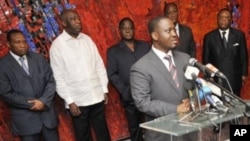As candidates in Ivory Coast prepare to launch their official campaigns Friday, election observers say a lot remains to be done to get the country ready to hold its long-delayed presidential poll on October 31.
Ivory Coast looks closer than ever to holding a presidential poll that has already been pushed back six times in the past five years.
Though official campaigning does not kick off until Friday, many of the 14 presidential candidates have already begun addressing crowds at rallies around the country.
In Abidjan this weekend, current president and candidate, Laurent Gbagbo tells a crowd that he is asking for their votes to rebuild Ivory Coast. Ivory Coast has stumbled, he says, but its head did not touch the ground.
The election is meant to bring an end to nearly a decade of political crisis after a 2002 civil war split the country between north and south.
With less than three weeks to go, Ivory Coast's electoral commission says preparations are moving forward and it will be ready for the poll on October 31.
Sabina Vigani is the Ivory Coast country director for the American-based Carter Center, which has been on the ground in Ivory Coast for the past two years and has already deployed 10 long-term election observers around the country.
Vigani says the timeline for holding elections on the 31 is tight. A lot of work is still underway, but she says the authorities have demonstrated a strong political will to do everything they can to respect that date. She says a lot of funding has been mobilized, particularly from the international community. Still, in the weeks ahead, she says there is a lot to be done.
Ivory Coast is still in the process of recruiting and training the more than 60,000 polling agents it will need on October 31.
The Carter Center's Vigani says well-trained voting staff are vital to a peaceful and successful vote.
She says on voting day, poor management of polling stations could create tension and delays in the voting process. To ensure qualified personnel, she says Ivorian authorities are in the process of recruiting polling staff from among civil servants, including teachers and state health and environmental workers.
The questions of "who is Ivorian" and "who can vote" were at the heart of the 2002-2003 civil war, and Ivory Coast overcame a persistent electoral hurdle last month with the publication of a definitive voter list containing more than 5.7 million names.
Electoral authorities began distributing electoral and identity cards to voters in Abidjan last week, but Vigani says progress in the rest of the country has been slow.
She says Bouake, the main rebel town in the north, is the only place outside Abidjan where cards are currently being distributed. In many regions, she says voter and ID cards have arrived but distribution staff must finish their training before they can begin handing them out. She says distribution is gradually spreading throughout the country, and by the end of the week voters in regional centers and the more urban areas should begin receiving their cards.
Voters, she said, will also be able to pick up their cards on election day.
The United Nations Operation to Ivory Coast is assisting Ivorian authorities with logistical preparations of the poll, including transporting voter materials to polling stations.
Last week, the U.N. began deploying an additional 500 peacekeepers to Ivory Coast to support the 8000-soldier Ivorian force that will be responsible for security during the election. According to Ouagadougou peace accords, half of those 8000 soldiers will come from government troops and the other half from the former rebel factions in the north.
Jean-Pierre Pallasset is commander of the French military operation in Ivory Coast, called the Force Licorne, that is training the Ivorian electoral security force.
Pallasset says it is essential that the soldiers be able to remain calm to inspire confidence and show Ivorians that they are ready no matter what happens. He says they need to be able to assess situations and take initiative while at the same time remaining disciplined. He says they need to learn, for example, that a large crowd is not necessarily hostile.
The country's rebel factions in the north were set to be disarmed before the poll, but instead rebel leaders say their forces will be confined to barracks for the vote.
The Carter Center's Vigani says a lot remains to be done with regards to both the former rebels in the north and the pro-government militias in south, but she says authorities are aware of the risks, which will hopefully help prevent problems. She says people are particularly alert and know that certain issues will not be resolved until after the vote.
Though not a cure-all, she said, a successful poll would open the way for a true reunification of the country.
Ivory Coast Presidential Campaigns About to Get Underway
- By Anne Look




